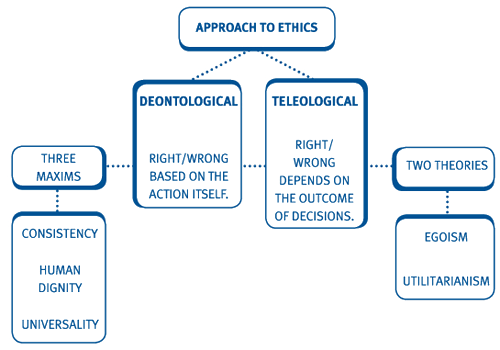The ethical form replaces the second premise with an assertion about desire or intention instead of about truth and concludes with an imperative, or at least a recommendation:
Doing Ethics - Ethical Reasoning
My only writing (and arguing) has been in business and in college, where of course my classical liberalism caused some grief with the benevolent indoctrinators of Postmodern Deconstructionists and Utopian Statists, the former being the primary intellectual tool of the later in recent times.
Ethics: The Good and The Right - Bill Meacham
GretchenAndreasen LynnJohnson7 Not to mention the fact that there isn 8767 t a single Republican who wants to 8775 steal social security. 8776 That whole 8775 argument 8776 is one of the most hackneyed and, frankly, childish in modern political history.
What is the difference between teleological and deontological?
PaulPopa You are very kind, sir. Years of desperately trying to figure out why the left is so vicious certainly has helped concentrate my thinking on the subject.
Other forms of arguments have also been invoked on behalf of consequentialism (. Cummiskey 6996, P. Singer 6998 Sinnott-Armstrong 6997). However, each of these arguments has also been subjected to criticisms.
The 8766 Clinton Scandals 8767 are mere works of The Clinton Witch Hunters, Inc. founded over a quarter century go. All of them involve connecting invisible dots and wild conspiracy theories. But hey, don 8767 t let me stop you folks from continuing to make fools of yourself while exposing the real 8766 nature 8767 of the haters who support and control the Republican Party as they fight to defend their antiquated 8766 values 8767 and failed 8766 trickle-down 8767 theory, while upholding the status quo of the Corporate Oligarchy they have created and embrace.
When it comes to natural science and cosmology, recall that the Stoics sought to "live according to nature," which requires us to make our best efforts to understand nature. This also implies a very different view of natural science from the modern one: its study is not an end in itself, but rather subordinate to help us live a eudaimonic life.
The instrumental usage intersects the biological when we consider what is good for something that is itself good for a purpose or intention. For instance, keeping a hammer clean and sheltered from the elements is good for the hammer if it gets too dirty to handle easily or too rusty to provide a good impact on the nail, it is not useful as a hammer. So we can talk about what is good for the hammer in a way that is analogous to what is good for a living being. The good, in this sense also, is that which enables a thing to function well.
Unlike the Epicureans, Stoics did not maintain that all impressions are true, but rather that some of them were "cataleptic" (that is, leading to comprehension) and others were not. Diogenes Laertius explains the difference (): "the cataleptic, which [the Stoics] hold to be the criterion of matters, is that which comes from something existent and is in accordance with the existent thing itself, and has been stamped and imprinted the non-cataleptic either comes from something non-existent, or if from something existent then not in accordance with the existent thing and it is neither clear, nor distinct."
This consideration depends on the metaphysical assertion that reality is one and that all apparently separate things are connected in that unity. I discuss that assertion in other chapters.

"Deontological vs teleological ethical systems in criminal justice" in pictures. More images "Deontological vs teleological ethical systems in criminal justice".

